-
Załączniki bezpieczeństwa
Załczniki do produktuZałączniki dotyczące bezpieczeństwa produktu zawierają informacje o opakowaniu produktu i mogą dostarczać kluczowych informacji dotyczących bezpieczeństwa konkretnego produktu
-
Informacje o producencie
Informacje o producencieInformacje dotyczące produktu obejmują adres i powiązane dane producenta produktu.Fujimi
-
Osoba odpowiedzialna w UE
Osoba odpowiedzialna w UEPodmiot gospodarczy z siedzibą w UE zapewniający zgodność produktu z wymaganymi przepisami.
Fujimi 433288 Imperial Japanese Navy Light Cruiser Sakawa 1/700
Plastikowy model statku do sklejania. Nie zawiera Kleju ani farby.
Lekki krążownik „Sakawa” został położony w Arsenale Marynarki Wojennej w Sasebo w listopadzie 1945 roku jako czwarty okręt klasy Agano, a ukończony w listopadzie 1945 roku pod koniec wojny. Typ Agano był planowany jako okręt flagowy eskadry niszczycieli i ma nowoczesny wygląd i uzbrojenie, które odróżnia go od poprzedniego typu 5500 ton. Działo główne było wyposażone w trzy podwójne działa 15 cm i dwa nowo opracowane, długie, podwójne działa 8 cm o wysokim kącie. Zapach sake ustał miesiąc po bitwie w zatoce Leyte, a Połączona Flota nie była w stanie przeprowadzić zorganizowanych operacji. Przeniósł się z Sasebo do Kure i zaangażował się w treningi w zachodniej części Utsumi, ale nie miał szans na odgrywanie aktywnej roli i przeniósł się do Maizuru na miesiąc przed zakończeniem wojny. Właśnie nadszedł koniec wojny. Po wojnie odbył podróż w obie strony jako statek transportowy powrotny, a w lipcu 1946 r. został użyty jako statek testowy bomby atomowej na Bikini Atoll i zatonął.
Produkt to niepomalowany zestaw, który wymaga montażu klejem i pomalowania. Skala to 1/700 i jest to model morski, który nie obejmuje dna statku. Ten produkt wykorzystuje formę konwencjonalną (seria specjalna).
- Produkt może odtworzyć wygląd w momencie ukończenia.
- Wygląd wyposażone w sondy elektryczne nr 21, 22 i 13 od momentu realizacji.
- Pojedynczy karabin maszynowy 25 mm jest wyposażony w 18 jednostek, a karabin maszynowy 25 mm jest wyposażony od początku w 10 jednostek, w przeciwieństwie do siostrzanych statków.
- Odtwórz nowoczesny kształt typu Agano, który różni się od dotychczasowych japońskich lekkich krążowników
- Kadłub jest klejony lewy i prawy, a iluminator jest zamknięty, a liczba jest zmniejszona w porównaniu z siostrzanym statkiem.
- Obwód elektryczny po lewej stronie, który biegnie z boku, jest delikatną rzeźbą, która nawet wyraża część zapięcia.
- Na pokładzie i każdej warstwie mostu metalowe elementy mocujące, które wyrażają podłogę z linoleum i antypoślizgowy / paskowy wzór żelaznego pokładu, są wyrażone ostrymi rzeźbami.
- Część schronu przed mostem jest zintegrowana z częściami za pomocą formy ślizgowej. Do precyzyjnego rzeźbienia i modelowania na bocznej ścianie.
- Główna wieżyczka to forma ślizgowa, która odtwarza okna, szwy rattalu i blachy stalowej po bokach i na górze.
- Realistyczne modelowanie z usuniętą siatką w górnej części komina, a wewnętrzna płyta rektyfikacyjna jest również trójwymiarowa jako oddzielna część.
- Komin jest klejony lewy i prawy, a także grawerowany jest małpi ratal. Każda rura parowa jest niezależną częścią i wyraża różnicę w stosunku do siostrzanego statku.
- Trójkątna kratownica ostrosłupowa na dole masztu jest wyciągana za pomocą formy ślizgowej.
- Małe dźwigi po obu stronach tylnego końca pokładu roboczego lotnictwa są odwzorowane trójwymiarowo i dokładnie z oddzielnymi częściami.
- 4,5-metrowy dalmierz wysokokątny dokładnie kształtuje kształt ramienia kolumny lub jest dołączony jako dedykowana część.
- Sonda elektryczna nr 22, rampa (przechowywanie), antena kierunkowska, schowek na skrzydło pomocnicze, itp. są wykonane w osobnych częściach.
- Długa 8 cm podwójna broń kątowa jest rejestrowana jako specjalnie zaprojektowany produkt z osłoną i lufą jako oddzielnymi częściami.
- Żuraw rozpoznawczy wody odtwarza nawet lekkie otwory z boku, aby poprawić poczucie precyzji.
- Wodnosamolot pokładowy zawiera dwa wodnosamoloty typu zero (trzymiejscowe). Kolor listwy jest szary.
Specjalne części do charakterystycznych części zapach sake
- Okienko celownika z przodu głównej wieży jest powiększone tylko dla zapachu sake i dostępne są specjalne części do form.
- W przypadku pokładu roboczego dla lotnictwa różnicę kształtu wraz z otworem przygotowuje się za pomocą specjalnych części.
- Komin i rura zrzutowa pary są wykonane ze specjalnych części, aby odtworzyć różnicę między poszczególnymi statkami.
- Podstawka przeciwlotnicza ma kształt kanciasty, który różni się od Agano i Noshiro.
- Karabin maszynowy Typ 96 25 mm (potrójny / pojedynczy) można wybrać z dwóch rodzajów części wysokiej jakości
- Precyzyjny kształt z oddzielną lufą i mocowaniem, konstrukcja ułatwiająca malowanie osobno.
- Kolor listwy jest szary dla suwnicy i metaliczny pistolet dla lufy, dzięki czemu możliwe jest odwzorowywanie kolorami bez malowania.
- Konstrukcja, która pasuje do pozycji kleju, łącząc suwnicę i prowadnicę beczki oraz przecina bramę po użyciu wlewu kleju.
- Potrójny karabin maszynowy ma jako osobną część kuloodporną płytę, dzięki czemu możliwe jest jeszcze bardziej precyzyjne.
- Drugi typ zawiera konwencjonalny, integralnie formowany typ. -Dwa rodzaje dołączonych naklejek
Dwa rodzaje dołączonych kalkomanii to kalkomanie, które zawierają oznaczenia flagi okrętu wojennego, flagi słońca i statku powietrznego lotniskowca. Dostępne są trzy rozmiary flag okrętów wojennych. Zawiera wymiary w skali 1/700 rzeczywistej szerokości 10, szerokości 6 i szerokości 3. Rekordy, takie jak Hinomaru samolotów na lotniskowcach i opaska identyfikacyjna (żółty pasek), a Hinomaru obejmuje te bez białej ramki w drugiej połowie wojny. Kalkomania, która zawiera oznaczenie szkicu, emblemat kwiatu chryzantemy na dziobie i oznaczenie nazwy statku na rufie (dwa rodzaje złotego i kolorowego malowania okrętu). Formowane części składają się z trzech kolorów, szarego, przezroczystego i metalicznego, które imitują kolor Kure Naval Arsenal. Liczba zmontowanych części 207 punktów
The light cruiser "Sakawa" was laid down at the Sasebo Naval Arsenal in November 1945 during the war as the fourth Agano-class ship, and was completed in November 1945 at the end of the war. The Agano type is planned as a flagship of the Destroyer Squadron, and features a modern appearance and armament that sets it apart from the previous 5,500 ton type. The main gun was equipped with three 15 cm twin guns and two newly developed long 8 cm twin high angle guns.
The scent of sake was completed the month after the Battle of Leyte Gulf, and the Combined Fleet was unable to carry out organized operations. Moved from Sasebo to Kure and engaged in training in the western part of the Utsumi, but had no chance to play an active role, and moved to Maizuru in the month before the end of the war. The end of the war was just reached. After the war, it made a round trip to the outer land as a return transport ship, and in July 1946, it was used as an atomic bomb test ship at Bikini Atoll and sank.
The product is an unpainted kit that requires adhesive assembly and painting. The scale is 1/700, and it is an offshore model that does not include the bottom of the ship. This product uses a conventional (special series) mold.
- The product can reproduce the appearance at the time of completion.
- The appearance equipped with No. 21, 22, and 13 electric probes from the time of completion.
- The 25mm single machine gun is equipped with 18 units, and the 25mm machine gun is equipped with 10 units from the beginning unlike the sister ships.
- Reproduce the modern Agano type shape that is different from the flow of Japanese light cruisers until then
- The hull is a left and right bonded type, and the porthole is closed and the number is reduced compared to the sister ship.
- The port side electric circuit that runs all around the side is a delicate sculpture that even expresses the fastener part.
- On the deck and each layer of the bridge, the holding metal fittings that express the linoleum floor and the non-slip / strip pattern of the iron deck are expressed with sharp sculptures.
- The shelter part in front of the bridge is integrated into parts using a slide mold. For precise sculpture and modeling on the side wall.
- The main turret is a slide mold that reproduces windows, rattal and steel plate seams on the sides and top.
- Realistic modeling with the grid at the top of the chimney removed, and the internal rectifying plate is also three-dimensionalized as a separate part.
- The chimney is a left and right bonded type, and the monkey rattal is also engraved. Each steam pipe is an independent part and expresses the difference from the sister ship.
- The triangular pyramid truss at the bottom of the mast is pulled out using a slide mold.
- Small cranes on both sides of the rear end of the aviation work deck are reproduced three-dimensionally and accurately with separate parts.
- The 4.5-meter high-angle rangefinder accurately shapes the columnar arm shape or is enclosed as a dedicated part.
- No. 22 electric probe, ramp (storage), direction finding antenna, auxiliary wing storage, etc. are all made into separate parts.
- The long 8 cm twin high angle gun is recorded as a specially designed product with the shield and barrel as separate parts.
- The water reconnaissance crane reproduces even the light holes on the side to improve the sense of precision.
- The on-board seaplane includes two zero-type (three-seater) seaplanes. The molding color is gray.
Special parts for the characteristic parts of the scent of sake
- The aiming hand window on the front of the main turret is enlarged only for the scent of sake, and special mold parts are available.
- For the aviation work deck, the shape difference including the opening is prepared with special parts.
- The chimney and steam dump pipe are made into special parts to reproduce the difference between individual ships.
- The anti-aircraft device stand is shaped like an angular shape that is different from Agano and Noshiro.
- Type 96 25 mm machine gun (triple / single) can be selected from two types of quality parts
- Precision shape with separate barrel and mount, structure that makes it easy to paint separately.
- The molding color is gray for the gantry and gun metallic for the barrel, so color-coded expression is possible without painting.
- A design that fits in the adhesive position by combining the gantry and the runner of the barrel, and cuts the gate after using the pouring adhesive.
- The triple machine gun has a bulletproof plate as a separate part, making it possible to make it even more precise.
- The other type contains a conventional integrally molded type.
Two types of attached decals. Two types of attached decals are decals that include the markings of the warship flag, the sun flag, and the carrier-based aircraft. Three sizes of warship flags are available. Includes 1/700 scale dimensions of the actual 10 width, 6 width, and 3 width. Records such as the Hinomaru of carrier-based aircraft and the identification band (yellow band), and the Hinomaru includes those without a white border in the latter half of the war. A decal that includes the draft notation, the chrysanthemum flower emblem on the bow, and the ship name notation on the stern (two types of gold and warship color painting).
The molded parts are composed of three colors, gray, transparent, and gun metallic, which imitate the color of Kure Naval Arsenal. Number of assembled parts 207 points













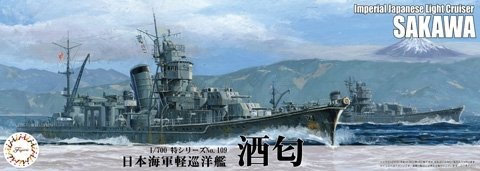
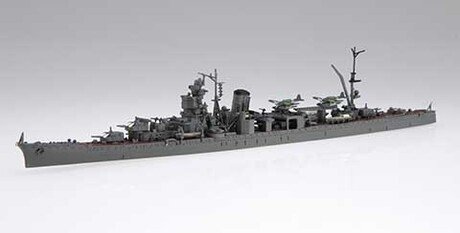

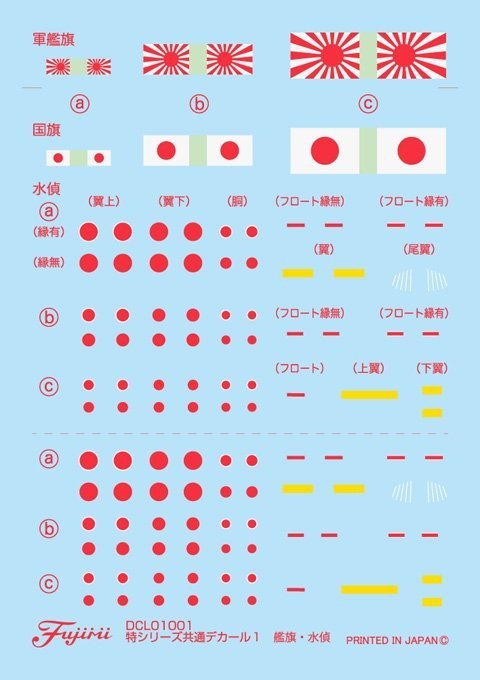
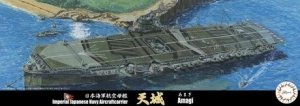
 1 szt.
1 szt.
 16 szt.
16 szt.

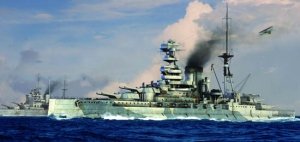
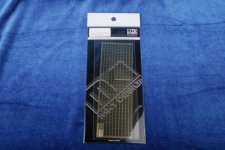
 3 szt.
3 szt.
 4 szt.
4 szt.